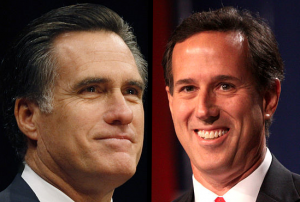Analysis: What Arizona, Michigan Primaries Mean For The GOP
Just hours before primaries in Arizona and Michigan, Mitt Romney and Rick Santorum have come into view as the two Republican contenders vying for leadership in what may well be the most important phase of the internal processes thus far. The latest polls put Romney and Santorum in a virtual tie in both Arizona and Michigan, providing a slight advantage that favors Romney as Tuesday’s primary comes near.
This could turn the GOP presidential nomination into a two-person race. Tuesday, voters will go to the polls in both states to make their pick from the last four candidates of the Republican pack – including Newt Gingrich, and Ron Paul; in a preamble to a series of critical contests leading to Super Tuesday, which will consist of three caucuses and seven primaries in 10 states, March 6.
But Romney is not showing any concern over Arizona, where Gov. Jan Brewer, known for her hard line on immigration policy and for signing into law the controversial SB1070, announced her endorsement on Sunday. Other prominent Republican figures backing the former Massachusetts governor include New Jersey Gov. Chris Christie, and Arizona Sen. John McCain.
Romney instead, focusing on Michigan, where he is running an aggressive TV ad campaign, and where Santorum has gained some terrain. The outcome in Romney’s home state of Michigan is particularly important, if Romney loses it will be a huge blow, more damaging to him than to Santorum, and would be also be seen as evidence of Romney’s inability to attract conservative support in the primaries, or against President Barack Obama in the general election.
Precisely, an Associated Press-Gfk poll released Wednesday found that Obama would potentially defeat any of the “final four” Republican hopefuls and also that the country is showing more optimism about the economy, which has been a main topic in the race. That explains the GOP’s discourse strategy, which is, has been, and will continue to be, based on attacking the Obama administrations’ most vulnerable issues: spending, national debt, lingering levels of unemployment and a sluggish economy.
Whoever is elected as the Republican presidential candidate will be pledging to his constituents not to bow to Saudi kings, will skip apology tours, secure the southern border and of course, challenge Obamacare. In fact, in 2010, that narrative carried the GOP to electoral victory. Through most of 2011, their political discourse kept such tone, which by the way, was also a recurring place during Wednesday’s night debate. Although, the Arizona stage — possibly the last faceoff of the season — didn’t seem to help Republican candidates after all. It could have been the most important dissertation platform of the entire cycle, the 20th debate. But it wasn’t.
Gingrich, Romney, Santorum, and Paul, engaged for nearly two hours in a heated and ineffective debate that resulted in the former Pennsylvania senator losing his recently gained momentum, as he spent a considerable portion of his on-air time defending his voting record in the Senate and also his use of earmarks. Romney defended his so-called “Romneycare” and displayed a very cynical, yet brilliant trick, turning the table around and blaming Santorum for Obamacare. Santorum took the bait and then went into a long explanation. Tactical error. Not a good way to win undecided conservative Republican voters, which supposed to be the objective.
A specific characteristic of this particular debate was also the absence of a topic important to the region: immigration. Arizona is a border state where the issue of illegal immigration is critical to many voters, where 30% of the electorate is Latino. A vast majority of them became highly involved in the issue after the passage of SB 1070, saw the topic reduced to border enforcement and to a threat to veto the DREAM Act. Curiously, the most recent TIME magazine’s cover story features the importance of the Latino vote.
Dismissing this vital component, the night was consumed between the candidates’ attacks that little had to do with letting people know what they would do for the U.S., in the event any of them wins the nomination and eventually, the presidency. The hopefuls were tough on immigration, although Gingrich was perhaps the least extreme on the topic.
On the eve of the Michigan and Arizona primaries the candidates’ rhetoric continues to be increasingly personal and vitriolic. If none of them obtains a significant advantage and number of delegates to lead the pack, the fear is that Republicans would need to wait until August to hold a brokered convention. Meanwhile, there will be 13 primaries and caucuses between Tuesday, and March 6, the so called Super Tuesday. In such period of time, anything can happen.
Aurelia Fierros is a journalist with over 25 years experience in news and politics on TV, radio and print media, now embracing the multimedia era. Follow her on Twitter @AureliaFierros.
[Photos By Jessica Rinaldi, Gage Skidmore]

